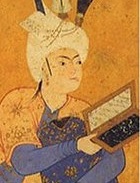1804 · London:
by TENNANT, Rev. William (1784-1848).
London:: C, [sic] Stewart, 1804., 1804. NOTE: The "C," [sic] is for the error of the comma. 2 volumes. 8vo. xxiv, 404; vii, 426 pp. 5 of 6 engraved plates; bound without the frontispiece. Contemporary speckled calf, gilt-rules, spine title, marbled endleaves; joints cracked, heavily rubbed covers, corners showing. Bookplate of Archibald Campbell. As is. Note: Plate in vol. I, facing p. 160 shows "Penitent at Benares", or "Hindoo penitent", a striking engraved plate showing an Indian fakir lying on a bed of nails or thorn couch (kantaka-sayya). The original watercolor drawing was commissioned by an Englishman, Jonathan Duncan, who arrived in India in 1772. / "Reverend William Tennant was a chaplain of the Bengal Army. Tennant's job allowed him to travel widely across the Bengal province. In Tennant's own words, he had the opportunity of residing at different parts of the country and used his time to examine the custom and practices of the "Hindoos" and "Mahommedans", particularly pertaining those to the rural economy. Tennant's penned his experiences and observations in two volumes. The first volume was published by C. Stewart at Edinburgh, in the year 1803." / "The selections from the text have been made from the chapters on Origin and Present State of the Maratha Empire, Domestic Slavery, Peculiarities of Mussalman character and General Sketch of the Maratha Governement. Tennant in these chapters highlight on the corrupt and rapacious nature of Maratha State and considers the Maratha raids to be responsible for excalating the dimensions of the 1770 famine. Tennant also discusses the institutions of the slavery which he observed in 'Hindoo' and how during the times of scarcity or famine even children were sold in the slave market." – Univ. of Exeter, Famine and Dearth in India and Britain 1550-1800. p. 28. PROVENANCE: Sir Archibald Campbell, 1st Baronet GCB (1769-1843) was a Scottish soldier who served as an officer in the British Army, with his bookplate "Pro aris et focis" showing the head of a stag. From 1824 to 1826, Gen. Campbell commanded the British forces in the First Anglo-Burmese War, the longest and most expensive war in British Indian history, that gave the British control of Assam, Manipur, Cachar, Jaintia, Arakan and Tenasserim. See: M. F. Conolly, Memoir of the life and writings of William Tennant, (1861).
(Inventory #: TK0034)










